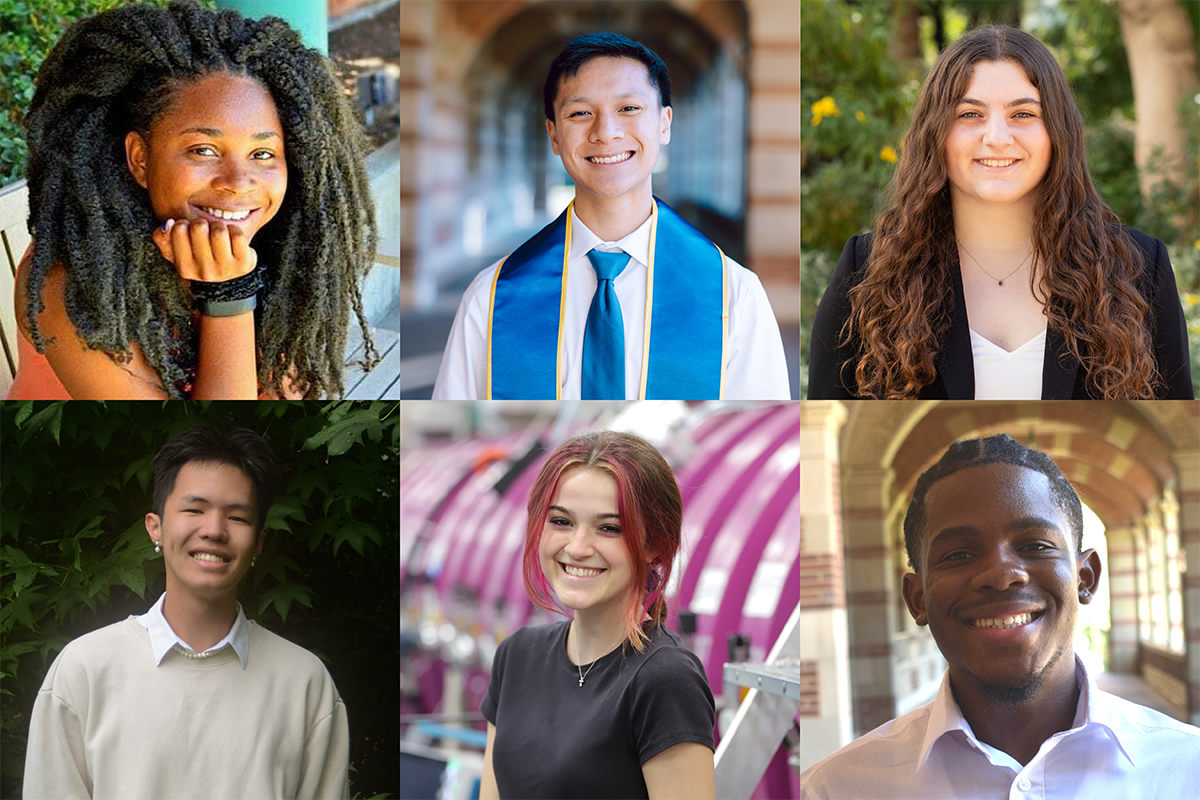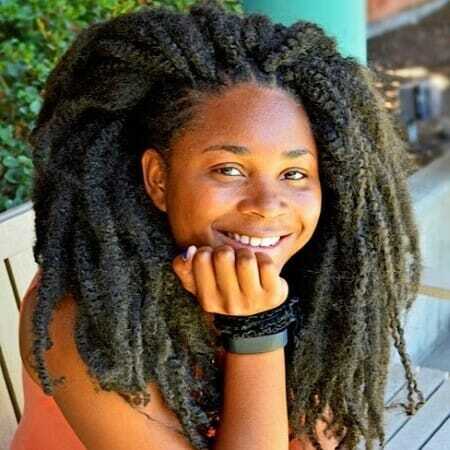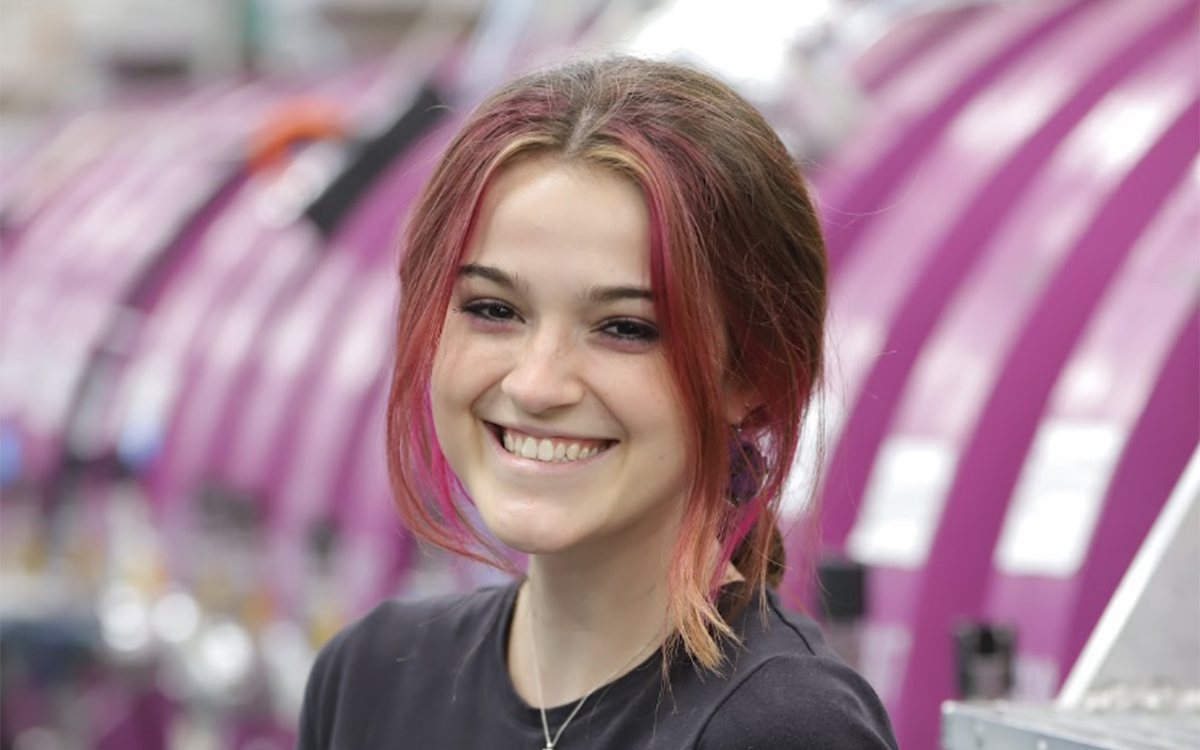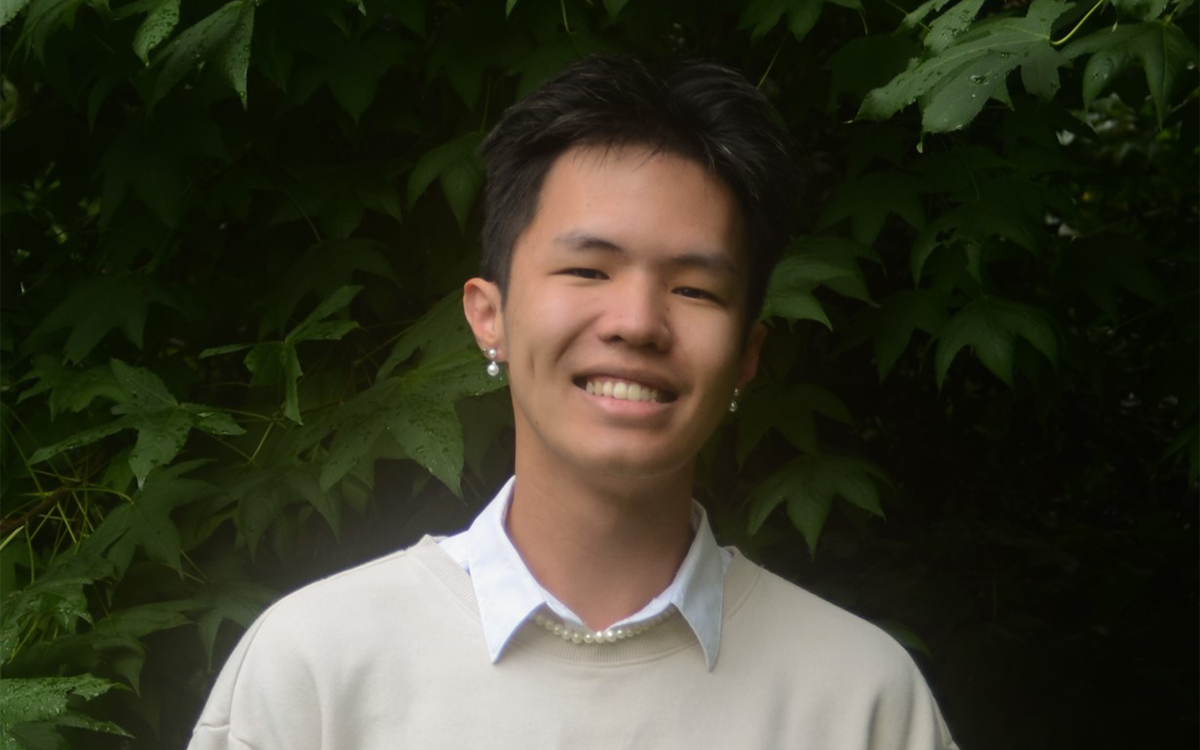Scientific rigor and creativity on display at Undergraduate Research Week 2024
Meet some of this year’s more than 1,600 student researchers

By Kayla McCormack | May 16, 2024
Now in its eleventh year, Undergraduate Research Week showcases students’ brilliance and creativity across disciplines. More than 1,600 students are presenting their innovative and impactful work at UCLA’s largest undergraduate conference this May 20–24. Get to know some of them below in their own words.
Justin Amakor
Molecular, cell and developmental biology major and biomedical research minor
My project focuses on identifying the macrophage osteopontin’s role in Duchenne muscular dystrophy. With immunofluorescence, microscopy, cell culture, single-cell RNA sequencing analysis and genotyping, I looked at changes in intramuscular fat resulting from the absence of osteopontin.
Conducting undergraduate research has made me realize the importance of mentorship, especially from people that look like me and come from a similar background. I have also enjoyed the opportunity to mentor and help other people pursue their passion for research.
My research experience has solidified my goal of becoming a physician-scientist. The ability to design experiments based on the knowledge I have acquired in order to answer my questions has satisfied my curiosity and pursuit of knowledge.
My advice to other students is to take every opportunity to learn about other people’s research. Not only does this diversify your scientific knowledge, it also helps with your overall understanding of science. The latter will be crucial when it comes to creating and applying new ideas that will move your research forward.
Adelene Bertha
Psychology major

The Skid Row Field Observation research project is implemented around Professor Patricia M. Greenfield’s Gemeinschaft and Gesellschaft-adapted theoretical framework, as taught in Psychology 133G: Culture and Human Development. After taking the course, I posed the hypothesis that “Skid Row is a Gemeinschaft ecology with values and behaviors that are adapted to it.” The project focused on ethnographic field observations and natural conversations with Skid Row residents who volunteered to participate in this research venture. With the aid of my mentor, I am working to integrate the observational data into a research publication and a presentation for URW.
The most rewarding part of this process has been building a sense of trust with the research participants who volunteered. I am confident this experience will help me accomplish my goal of working with communities that have limited resources and providing solutions to issues through research.
My advice to other students is to connect with a professor who is teaching a course that connects to the type of research you hope to conduct. They will have valuable experience in the subject that will allow you to grow as a first-time researcher.
Jessica Gonzalez
Astrophysics major

I’m doing research on the Large Plasma Device, a 20-meter-long experimental chamber at UCLA designed to study basic plasma physics, nuclear fusion energy and astrophysical phenomena. My project is focused on how we can use spectroscopy — measurements of electromagnetic radiation — as a non-invasive diagnostic to determine plasma characteristics. Specifically, I will be comparing the results of a collisional radiative model to experimental measurements in order to predict spectral line ratios relevant to electron temperature and electron density within the device.
The most rewarding part of this has been the incredible community I’ve had the opportunity to become a part of. All of the graduate students, mentors and staff scientists in the labs I have worked in have been so welcoming and open to sharing their knowledge. The uplifting atmosphere has made research fun and exciting, even when the project itself gets frustrating. They are always eager to answer my questions — both simple and bizarre — and include me in the ongoing lab activities. A huge shout-out to all of the amazing people at UCLA’s Basic Plasma Science Facility and MIT’s Plasma and Space Propulsion Laboratory!
Before doing undergraduate research, I never would have seen myself going to graduate school. I barely understood what getting a Ph.D. meant. I didn’t realize how much I loved being in a lab until I saw plasma for the first time — from that moment on, I wanted to know and see more of this funny purple electricity. My experiences studying plasma physics at UCLA made me fall in love with both research and the scientific community, ultimately solidifying my decision to pursue a Ph.D. in applied physics at the California Institute of Technology this coming fall.
My advice to other students is: Don’t be afraid to ask questions. UCLA is full of remarkable scientists and driven students who are excited to share their knowledge. Going to research talks and not understanding anything beyond the first slide in a presentation — something even professional scientists go through — just means you have the opportunity to learn so much. In my experience, people love to talk about their research, so never hesitate to spark up a conversation with someone you’ve met in a club, a professor during their office hours, or your TA after discussion. Email people whose work interests you — even if it just sounds cool. Find a mentor (alumni, upperclassmen, industry, etc.) who has been in your shoes. Go to networking and club events. Express interest and curiosity in all you do — it’ll take you a long way!
Also, another quick piece of advice: log your research and what you’ve learned each day in lab. Looking back at what you understood a year ago versus today will show you that you do know a lot and you are growing as a scientist every day.
Shannon O’Malley
Psychology major and disability studies and public affairs double minor
In this creative video, we wanted to showcase each athlete’s individuality and the athlete-centered approach we take at UCLA Special Olympics. We used interviews and live footage of our community practices to showcase each athlete’s uniqueness, capture what makes this a family to them and detail how inclusive spaces can be tailored to the diverse needs of so many people. Our results show that disability is truly a social issue created by society’s barriers that prevent the full participation of disabled individuals in society. This creative piece tells the stories of our athletes and how society’s choice of promoting inclusive spaces, like the UCLA Special Olympics, can be transformational in the lives and opportunities available for disabled individuals.
The most rewarding part of conducting this research has been capturing a family that has impacted my life immensely: Special Olympics at UCLA. This has been the highlight of my college experience and I always look forward to practices with our athletes. Special Olympics at UCLA is a space where all are welcomed and uplifted. I have loved being able to capture the fun, joy and memories we make in this space. From the friendships made to weekly birthday songs, dance parties and endless support everyone gives and receives, I am so grateful to be able to create a piece that showcases our community. I have built such great relationships with our athletes, who are all adults who are part of the intellectually and developmentally disabled community and I love being able to talk to them throughout the week outside of practices, too. I hope this video inspires others to create inclusive spaces where all can come together and form forever-friendships, make memories and be part of a community where they are welcomed and celebrated.
I desire to pursue disability rights and dedicate my future to serving and furthering the disability field. I hope to be able to help uplift the voices of disabled people who have been suppressed for a long time. I want to go into disability rights law and be an advocate for individuals who belong to the intellectual and developmental disabilities community. It is so important that disabled individuals receive the accommodations they need and are included in the community. I want to help create accessible spaces for all where inclusion is the norm between disabled individuals and their non-disabled peers. This can help create a future of unity in employment, education, society and beyond.
I would highly recommend pursuing undergraduate research! It is so important to follow your passion and help contribute to a field you desire to impact. When pursuing research, you should make sure you are working toward something you have a heart for doing and contributing to. This is how the greatest impact will be made all around.
Cameron Ong
Microbiology, immunology and molecular genetics major
My research project in the Arboleda Lab at UCLA focuses on how we can utilize small molecule inhibitors to better understand how the protein known as lysine acetyltransferase 6A (KAT6A) functions to alter the epigenome and transcription. This protein is central to the lab’s research because pathogenic mutations in KAT6A result in a rare neurodevelopmental disorder known as Arboleda-Tham Syndrome.
The most rewarding part of this experience would have to be the opportunity to see my long-term projects take shape as I go from starting experiments to collecting data. With an individual project, I have been able to troubleshoot, hypothesize and collect novel data that has been truly exciting.
My research project has fueled my passion for academic research in microbiology. My interest in immunological and genetic research inspires me to pursue a career in research as I begin my Ph.D. program in biological sciences this fall.
My advice to other students is to cast your net wide when looking for opportunities. All laboratory experience provides excellent opportunities to learn what it means to be a contributing researcher. Plus, you may be surprised at how fascinating each lab’s research is, even if it is a little different than your major.
Olivia Peony
Neuroscience major and gender studies minor
Our current research project investigates the long-term cardiac health outcomes in Her2-positive breast cancer patients. Her2-positive cancers express a protein that accelerates cancer growth. This type of cancer occurs more frequently in younger women who tend to have lower cardiovascular risks. With the increasing rate of survival given the recent advancements in Her2 therapy, we want to investigate the longitudinal impact of Her2 therapies on cardiovascular health.
The most rewarding part about undergraduate research is learning from many people (mentors, principal investigators, post-docs, etc.) and being able to expand on the research question of interest. Being involved in research means exploring questions that might not have been asked before and it is fascinating to learn how research findings are being produced and published to complete the current body of literature.
Research involvement helped me direct my passion for science to pursue medicine as a career. I grew up in Indonesia where it is uncommon for full-time physicians to do research. Since I became involved in research at UCLA, I realized that doing research as a physician is possible. This research project has affirmed my interest in medicine and shaped my goal to become a clinician-researcher in the future.
My advice to other students is to be proactive! Being involved in research as an undergraduate student can be very intimidating as it is a long learning process, but remember that faculty mentors are very happy and willing to share their knowledge with students. That said, be proactive in asking questions, asking for help and learning new skills. And lastly — have fun doing research!
Jessica Persano
Political science and geography/environmental studies double major
My project has focused on identifying barriers to accessing post-sexual-assault care for UCLA students with disabilities. Not only is there limited research on this population, emergent evidence indicates that students with disabilities are victims of sexual violence at excessively high rates, but their experiences are commonly overlooked. Thus, more research is needed to understand the experience of UC student survivors with disabilities who seek post-sexual-assault services, how existing barriers can be reduced and what kinds of support survivors envision in their pursuit of healing and justice.
Although I am grateful for the many aspects of my undergraduate research experience, the most rewarding part, so far, has been its profound impact on my personal and academic growth. I have had the unique opportunity to directly contribute to the scholarly debate on post-sexual-assault resource availability and usability, potentially influencing policy decisions on both a local and state level. In addition, the opportunity to work alongside esteemed professors and peers has immersed me in a collaborative, supportive community that values knowledge and innovation, further motivating me to continue using research as a tool to make a difference in our communities.
This research project has directly advanced the skills I need to become a quality, principled and talented researcher and, hopefully, a political science doctoral student as well. Through my project, I have gained hands-on experience reading academic articles, writing literature reviews, submitting an institutional review board application, conducting in-depth interviews, analyzing transcribed interview data, synthesizing study results in written and presentation formats and more. Therefore, this experience has helped me be better prepared for the demands and challenges of Ph.D. programs in social sciences.
My advice to other students is to follow your passions and don’t feel restricted by what existing faculty or labs are researching. There are programs at UCLA that provide the opportunity for self-directed research — so be bold and original in what you want to study and don’t be afraid to take risks! Also, be tenacious. Conducting research comes with many challenges and setbacks; good researchers must have the perseverance to overcome them.
Mia Rosati
Ecology, behavior and evolution major
My research project investigated the relationship between bright plumage carotenoids and ectoparasite loads in house finches (Haemorhous mexicanus), a common North American passerine species. I pursued this research topic because I was intrigued by previous work studying how colorful ornamental feathers in male birds may signal higher immunocompetence and fitness. I was equally interested in learning more about host-parasite relationships and decided to study this, coupled with feather coloration, in an avian system.
The most rewarding parts of conducting undergraduate research are receiving mentorship from graduate students and faculty in the EEB department and fostering connections across departments and institutions. I see collaboration as one of the cornerstones of research, so it was gratifying to receive feedback and guidance from several talented ecologists at UCLA and beyond. Their help at each critical stage of this project has been invaluable and I hope to pay it forward one day as a mentor to younger generations of scientists — just as they’ve done for me. I am especially grateful to my PI, Professor Morgan Tingley, and my graduate student mentor, Graham Montgomery, who encouraged me to take on independent research and to apply to the Ecological Society of America’s 2024 annual meeting, where I will be giving a poster talk this August. I look forward to interacting with a dynamic and diverse group of ecologists at various stages of their careers and learning from their experiences and expertise in this field.
I’ve known for a while that I want to go to grad school to pursue a Ph.D. in ecology/conservation biology and continue on a research path, but knowing how to get there has often felt daunting and uncertain. As very few people in my family are in STEM careers, it can be difficult for my loved ones to understand my career goals and the steps to achieve them. Fortunately, by developing a support system within my lab, I have steadily gained confidence and a skill set that will make these dreams achievable. Moreover, the lessons I have learned during my three years in Professor Tingley’s lab are ones I will apply in academic and professional settings and other contexts where teamwork, organization, and self-advocacy are integral.
For any undergraduates looking to get their foot in the door, my advice, first and foremost, is to be willing to explore your options; being open-minded is crucial, whether you are applying to labs or planning a long-term research project. You never know what exciting and formative opportunities might present themselves when you least expect them, so don’t close yourself off to new experiences! As for the actual research, some key takeaways I’ve learned are to be patient with the process, consistently communicate your goals and needs with your mentors and not be afraid to ask questions and lean on others for support. Lastly, I highly recommend becoming comfortable with conducting thorough literature reviews to help yourself understand in depth what knowledge gaps remain in the topic you’re interested in and drawing figures will help you visualize your predictions or expected results.
Victor Xie
Asian American studies and English double major

My research project explores how China’s Cultural Revolution, formally known as the Great Proletarian Cultural Revolution, is preserved and portrayed in the U.S. I look at three highly accessible sources: digital news archives, digital oral history archives and Chinese American/Canadian fiction narratives. Using both archival and literary material, my research argues that the Cultural Revolution is often misremembered in the U.S. to fit a flattened, anti-communist, pro-American narrative, and suggests ways of mourning the revolution that are more critical of this skewed depiction.
The most rewarding part of this experience has been learning more about my own history. When I first started this research project, I had no idea what the Cultural Revolution was other than the dominant narratives of violence and trauma I had been told. However, after conducting this research, I have been able to work through the tensions of this history, while also gaining an analytical lens to resist Sinophobic and anti-communist sentiment in the U.S. Learning about this history through my own research — rather than the narratives others have pushed on to me — has been a challenging yet fulfilling experience. This research project affirmed my aspirations for graduate school. If I can finish this thesis, I can do anything!
My advice to other students is: Never do undergraduate research for free — there is always a grant or scholarship to apply for! Research is labor — and you should get compensated for it. Additionally, pursue research that genuinely interests you. What questions have you been asking all your life? This is definitely the main question I asked myself when I started this project and being at UCLA gave me the tools I needed. I promise you: searching, failing and, ultimately, finding the answers will be one of your most rewarding experiences at UCLA.
Find out more about Undergraduate Research Week.




